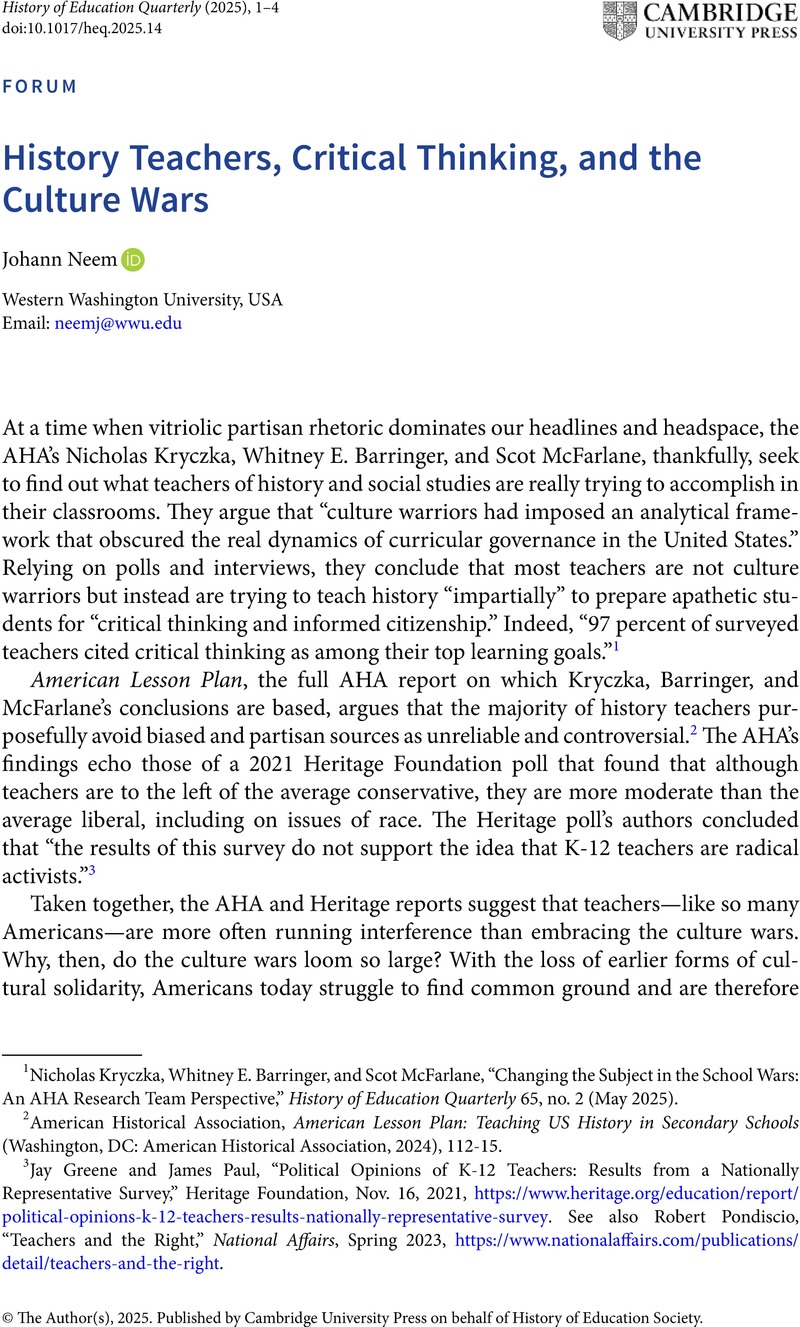No CrossRef data available.
Article contents
History Teachers, Critical Thinking, and the Culture Wars
Published online by Cambridge University Press: 24 March 2025
Abstract

- Type
- Forum
- Information
- Copyright
- © The Author(s), 2025. Published by Cambridge University Press on behalf of History of Education Society.
References
1 Nicholas Kryczka, Whitney E. Barringer, and Scot McFarlane, “Changing the Subject in the School Wars: An AHA Research Team Perspective,” History of Education Quarterly 65, no. 2 (May 2025).
2 American Historical Association, American Lesson Plan: Teaching US History in Secondary Schools (Washington, DC: American Historical Association, 2024), 112-15.
3 Jay Greene and James Paul, “Political Opinions of K-12 Teachers: Results from a Nationally Representative Survey,” Heritage Foundation, Nov. 16, 2021, https://www.heritage.org/education/report/political-opinions-k-12-teachers-results-nationally-representative-survey. See also Robert Pondiscio, “Teachers and the Right,” National Affairs, Spring 2023, https://www.nationalaffairs.com/publications/detail/teachers-and-the-right.
4 Among many sources, see James Davison Hunter, Democracy and Solidarity: On the Cultural Roots of America’s Political Crisis (New Haven, CT: Yale University Press, 2024); Michael J. Klarman, “The Degradation of American Democracy—and the Court,” Harvard Law Review 134, no. 1 (Nov. 2020).
5 See, for example, Jack Schneider and Jennifer Berkshire, A Wolf at the Schoolhouse Door: The Dismantling of Public Education and the Future of School (New York: The New Press, 2023); Josh Cowen, The Privateers: How Billionaires Created a Culture War and Sold School Vouchers (Cambridge, MA: Harvard Education Press, 2024).
6 David M. Houston and Alyssa Barone, “How the Engagement of High-Profile Partisan Officials Affects Education Politics, Public Opinion, and Polarization,” EdWorkingPaper No. 24-919, Annenberg Institute at Brown University, 2024, https://edworkingpapers.com/ai24-919. It is possible that the nationalization of education politics around culture war issues may have been pushed by grassroots activists at the state level. On this point, see Gerald Gamm et al., “The Culture War and Partisan Polarization: State Political Parties, 1960-2018,” Studies in American Political Development (Sept. 2024), 1-21.
7 American Historical Association, American Lesson Plan, 116-27.
8 Johann N. Neem, “A Usable Past for a Post-American Nation,” Hedgehog Review 24, no. 2 (Summer 2022), 28-37, https://hedgehogreview.com/issues/the-use-and-abuse-of-history/articles/a-usable-past-for-a-post-american-nation.
9 American Lesson Plan, 133, fig. 31.
10 This may be a false distinction. It is possible for the same person to subscribe to both positions.
11 American Lesson Plan, 133-34.
12 American Lesson Plan, 116-25. On progressive influence in education, see Rogers M. Smith and Desmond King, America’s Racial Battle Lines: Protect versus Repair (Chicago: University of Chicago Press, 2024), 106, 226-29; David M. Steiner with Susan D. Rozen, “Preparing Tomorrow’s Teachers: An Analysis of Syllabi from a Sample of America’s Schools of Education,” in A Qualified Teacher in Every Classroom? Appraising Old Answers and New Ideas, ed. Frederick M. Hess, Andrew J. Rotherham, and Kate Walsh (Cambridge, MA: Harvard Education Press, 2004), 119-48. See also David Steiner, “Skewed Perspective: What We Know about Teacher Preparation at Elite Education Schools,” Education Next 5, no. 1 (Oct. 2009 [2005]), https://www.educationnext.org/skewedperspective/; Lyell Asher, “How Ed Schools Became a Menace,” Chronicle of Higher Education, Apr. 8, 2018; Jay Schalin, The Politicization of University Schools of Education: The Long March through the Education Schools, James G. Martin Center for Academic Renewal, 2019, especially 48-60; Zach Goldberg and Eric Kaufmann, School Choice Is Not Enough: The Impact of Critical Social Justice Ideology in American Education, The Manhattan Institute, Feb. 2023, https://manhattan.institute/article/school-choice-is-not-enough-the-impact-of-critical-social-justice-ideology-in-american-education. For context see David F. Labaree, The Trouble with Ed Schools (New Haven, CT: Yale University Press, 2004), chaps. 7-8; Neil Gross, Why Are Professors Liberal and Why Do Conservatives Care? (Cambridge, MA: Harvard University Press, 2013), especially chaps. 1 and 4; and Christopher L. Busey, Kristen E. Duncan, and Tianna Dowie-Chin, “Critical What What? A Theoretical Systematic Review of 15 Years of Critical Race Theory Research in Social Studies Education, 2004-2019,” Review of Educational Research 93, no. 3 (June 2023), 412-53.
13 On conservative responses, see Woody Holton, “Chilling Affects: The Far Right Takes Aim at Black History,” American Historical Review 129, no. 1 (March 2024), 199-216.
14 Michael Roth, The Student: A Short History (New Haven, CT: Yale University Press, 2023), chap. 1. See also Jonathan Zimmerman, “‘Social Justice’ According to Whom?,” Chronicle of Higher Education, Sept. 22, 2019; William Peters, “Teachers’ Perspectives on the Purposes of Social Studies Education: A Critical Analysis” (PhD diss., Boston College, May 2022), especially 131-35.


